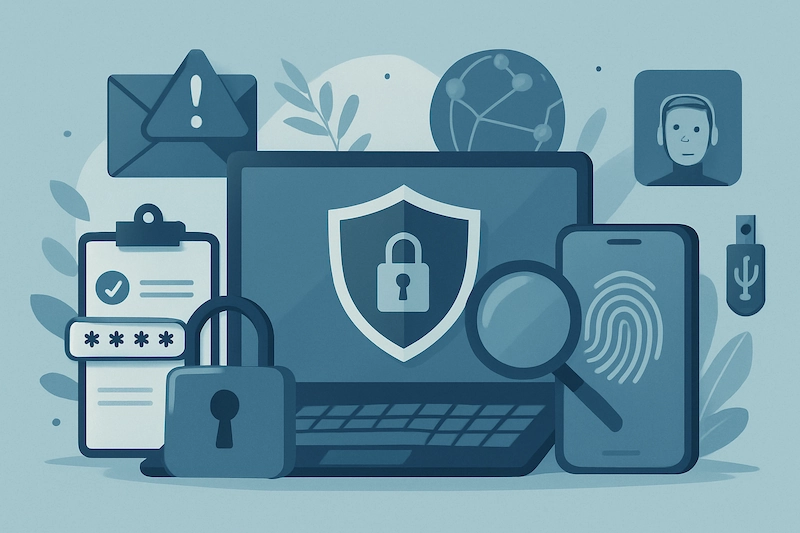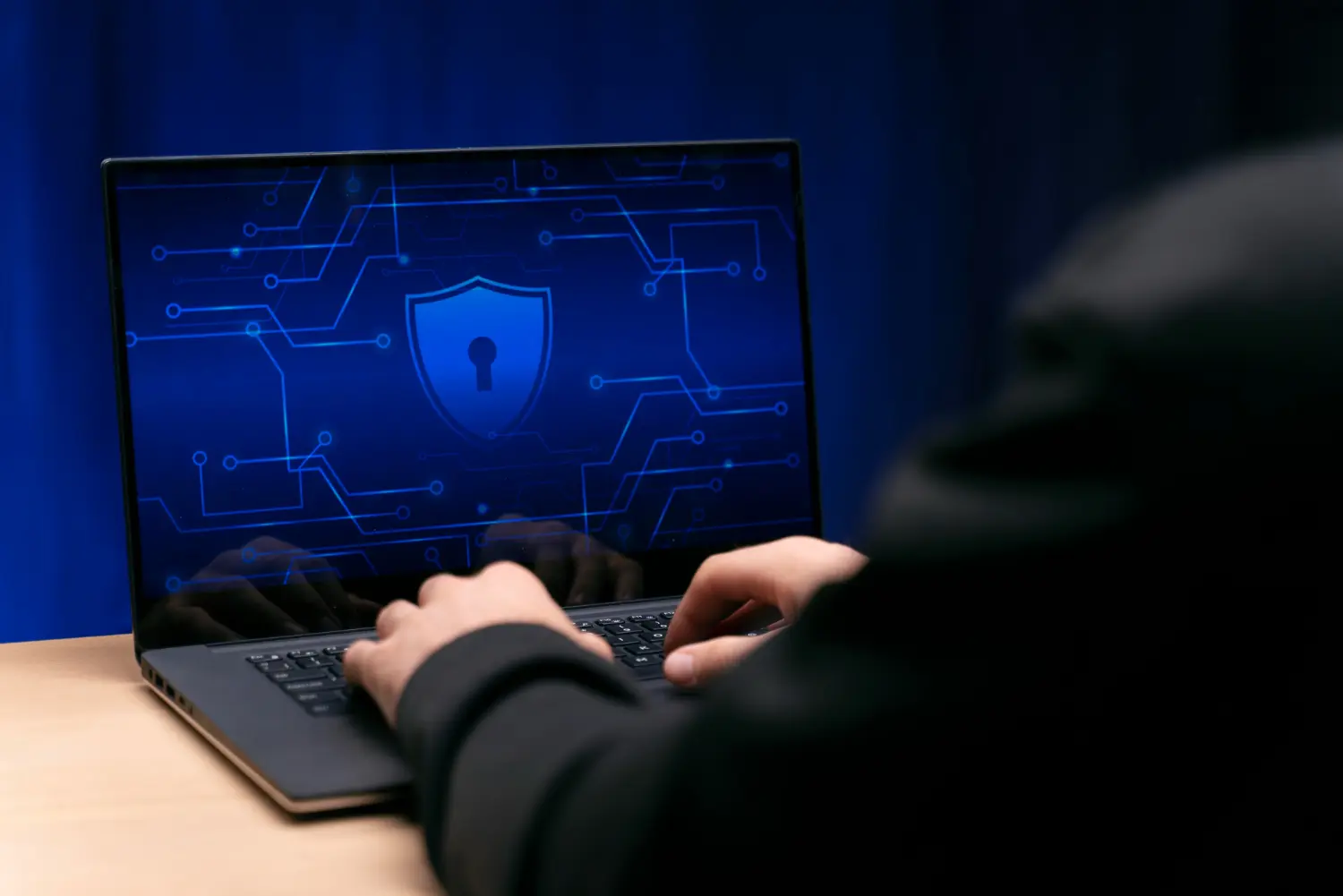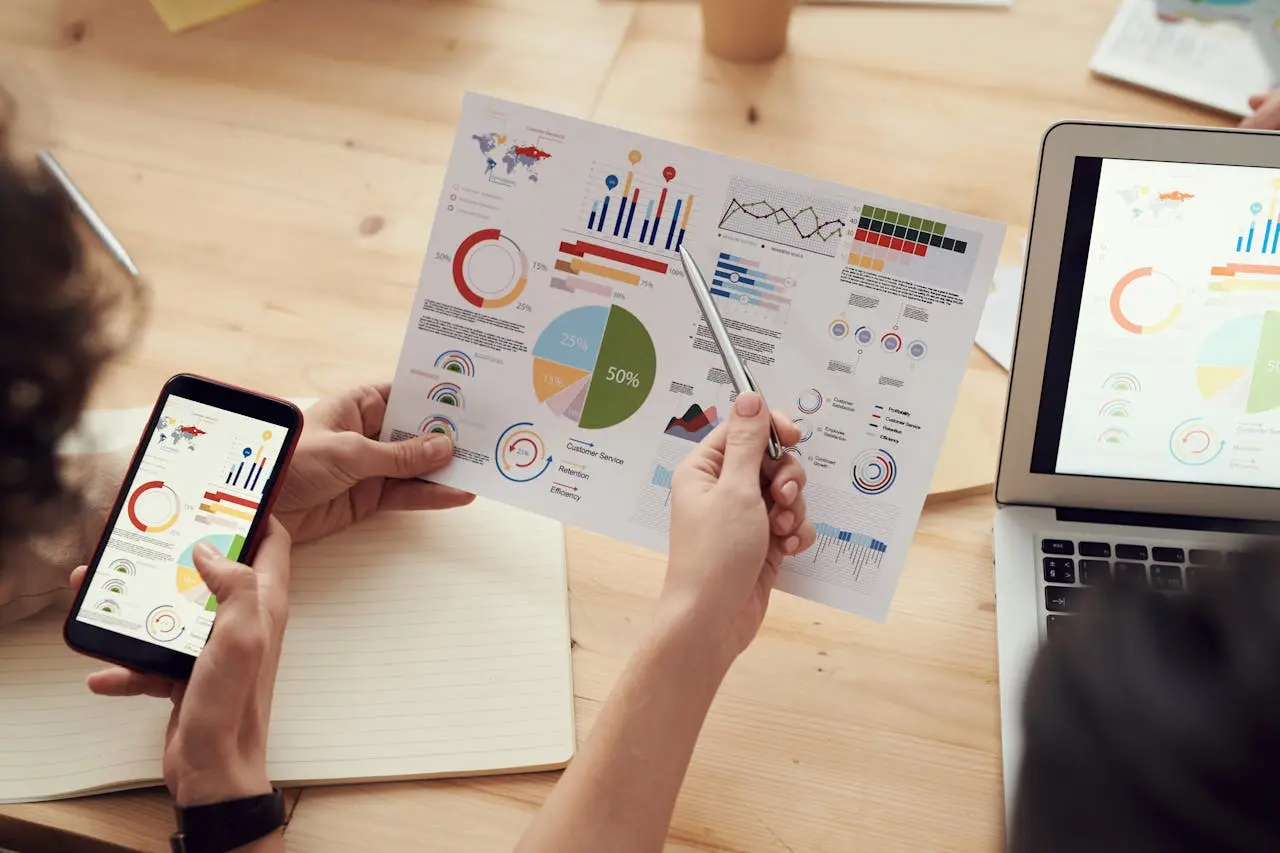🚨 Identity Theft 2025: How to Protect Your Data

Mauricio Vargas
Founder of Bitnotus | Technical Analyst and Web Developer

Table of Contents
- 🔍 What you’ll learn in this article
- 📊 The alarming reality of identity theft in 2025
- 🎭 The 5 most dangerous threats of 2025
- 🛡️ Your protection arsenal: tools that really work
- ✅ Security checklist: implement TODAY
- ⚖️ Legal framework: know your rights
- 🎯 Your action plan: start TODAY
- ❓ Frequently Asked Questions about Data Protection
- 📚 Verified references and sources
🔍 What you’ll learn in this article
Every 39 seconds, someone becomes a victim of identity theft. In 2025, cybercriminals use artificial intelligence to create more sophisticated scams than ever. From personalized phishing to convincing deepfakes, threats evolve faster than ever.
This guide teaches you exactly how to protect yourself from the most dangerous threats of 2025, with proven tools and strategies that really work:
🚨 Real cases of massive hacks and how to avoid them
🔍 Detect AI phishing before becoming a victim
🛡️ Free tools that shield your information
✅ Security checklist to implement today
📊 The alarming reality of identity theft in 2025
2.9B
data stolen in the National Public Data breach (2024)
$6.8M
average loss per hacked company according to IBM (2025)
39 sec
frequency of identity theft attacks (FTC, 2025)
190M
affected by the Change Healthcare hack (2025)
🔥 Recent documented real cases:
- • Change Healthcare (Feb 2024): 190M Americans affected by BlackCat/ALPHV ransomware (TechCrunch, 2025)
- • National Public Data (Apr 2024): 2.9B records with SSN and personal data (Wikipedia, 2024)
- • AT&T via Snowflake (Jul 2024): Nearly all wireless customers compromised (New York Post, 2024)
- • Ticketmaster (May 2024): 560M customers exposed by ShinyHunters (Tech.co, 2024)
🎭 The 5 most dangerous threats of 2025
1. 🤖 AI-powered phishing
Scammers now use AI to create emails, messages and calls indistinguishable from real ones. They no longer look for spelling errors: these attacks are perfect.
Verified real example: In 2024, OpenAI reported that a hacker stole internal secrets by accessing messaging systems, demonstrating how AI can be exploited as both a tool and a target (New York Times, 2024).
🚨 Warning signs:
- Extreme urgency (“your account will be closed in 24 hours”)
- Links that do NOT exactly match the official domain
- Requests for information your bank already has
- Pressure to act immediately over the phone
2. 📱 Malicious apps that steal data
1 in 10 apps on unofficial stores contains malware designed to steal banking and personal data.
Verified real case: In December 2024, multiple Chrome extensions were compromised with malicious code to steal cookies and authentication sessions (The Verge, 2024).
🛡️ How to protect yourself:
- Download ONLY from Google Play Store or official App Store
- Review permissions before installing (why does a flashlight need access to contacts?)
- Avoid apps that promise “free premium” features
- Use updated mobile antivirus
3. 🔓 Massive data breaches
When hackers attack large companies, millions of data records are sold on the dark web for pennies.
Documented real cases:
- National Public Data (2024): 2.9B records including full names, addresses, SSN and birth dates (Wikipedia, 2024)
- Change Healthcare (2024): 190M Americans affected with complete medical data (TechCrunch, 2025)
- AT&T via Snowflake (2024): Call metadata from nearly all customers (New York Post, 2024)
⚠️ Real impact if your data appears:
- Access to your bank accounts
- Loan applications in your name
- Creation of fake social media profiles
- Blackmail with personal information
4. 🎪 Deepfakes and voice impersonation
With just 3 seconds of audio, criminals can clone your voice to scam your family members.
Growing threat: Cybersecurity experts report a 3000% increase in malicious deepfakes during 2024, with documented cases of CEOs being impersonated to authorize fraudulent transfers.
🚨 How to recognize deepfakes:
- Slightly robotic or “perfect” audio
- Urgent calls asking for money or information
- Refusal to meet in person or video call
- Dramatic stories requiring immediate action
5. 🏠 Unsecured public WiFi networks
Did you know that connecting to café WiFi could cost you your bank account? Criminals create fake networks to intercept everything you send.
Documented common techniques:
- “Free” WiFi with names like “Starbucks_Free” or “Airport_WiFi”
- Interception of passwords and banking data
- Automatic malware installation on your device
🔒 Essential protection:
- NEVER access online banking on public WiFi
- Always use VPN on unknown networks
- Verify the exact WiFi name with venue staff
- Enable “Forget network” when leaving
🛡️ Your protection arsenal: tools that really work
🔐 Password managers (MANDATORY)
Bitwarden
Free, open source, auditable
RECOMMENDED1Password
Premium, ideal for families
PREMIUMLastPass
Easy for beginners
BASIC🔒 Reliable VPNs for secure connections
NordVPN
Global network, verified no-logs policy
- ✅ Servers in 60+ countries
- ✅ AES-256 encryption
- ✅ Automatic kill switch
ProtonVPN
Extreme privacy focus, free version available
- ✅ Based in Switzerland (strict laws)
- ✅ Secure Core routing
- ✅ Free plan available
🔍 Breach monitoring (check YOUR data)
🚨 Has your data already been stolen?
Check NOW if your email or phone appears in known breaches:
✅ Security checklist: implement TODAY
⚖️ Legal framework: know your rights
🇪🇺 GDPR (Europe) - Global protection
Applies to companies handling European data, regardless of location.
🇺🇸 CPRA (California) - Model for America
The most advanced US law, inspiring Latin American legislation.
🌎 Latin America - 2025 advances
Region evolving toward international protection standards.
🎯 Your action plan: start TODAY
⏰ The next 30 minutes can change your security forever
📅 Today (5 min)
- • Check breaches
- • Install Bitwarden
- • Enable 2FA on bank
📅 This week
- • Migrate all passwords
- • Install VPN
- • Audit social media
📅 This month
- • Educate family
- • Set up alerts
- • Review settings
Remember: Your personal information is worth more on the black market than you imagine. Protect it like you would protect your cash.
❓ Frequently Asked Questions about Data Protection
Are password managers really safe to use?
Yes, they're much safer than reusing passwords. Managers like Bitwarden use AES-256 encryption (same as banks), have public security audits, and even if hacked, your data would be encrypted. The risk of using weak or repeated passwords is 1000x greater.
What do I do if I discover my data was stolen?
Immediate action: 1) Change passwords on important accounts, 2) Enable 2FA on everything, 3) Monitor your bank accounts daily, 4) Consider freezing your credit report, 5) Report to your bank if you see suspicious activity. Don't panic - acting quickly minimizes damage.
Is it safe to do online banking on my phone?
Yes, if you take precautions: use only the bank's official app (not browser), never on public WiFi, keep your system updated, use PIN/biometrics to unlock, and log out when finished. Banking apps are safer than using web browsers.
Which free VPNs are actually secure?
Recommended: ProtonVPN (real free plan), Windscribe (10GB free), TunnelBear (500MB). AVOID: Hola VPN, TouchVPN, any VPN with excessive ads. Free VPNs that seem "too good to be true" usually sell your data.
Should I pay if my email or social media gets hacked?
NEVER pay ransom. Instead: 1) Immediately change password from another device, 2) Revoke all active sessions, 3) Check privacy settings, 4) Warn your contacts about the hack, 5) Report to the platform. Paying only encourages more attacks.
How do I protect my family without being a tech expert?
Simple family plan: 1) Install Bitwarden for everyone, 2) Enable 2FA on their important accounts, 3) Teach them to identify suspicious emails (urgency + asking for data), 4) Set up automatic updates on their devices, 5) Use a router with family content filtering.
Does my insurance cover identity theft?
Depends on your policy. Some homeowner's insurance includes basic identity protection. Check your policy or contact your insurer. There are also specific identity insurance options (LifeLock, Identity Guard) costing $10-30/month that include monitoring and assisted restoration.
Is it safe to use hotel and café WiFi?
For basic browsing with VPN enabled, yes. NEVER for: online banking, shopping, accessing important accounts. If you need to do something sensitive, use mobile data. Always verify the exact WiFi name with venue staff.
What to do if a family member falls for a voice cloning scam?
Family protocol: Establish a secret "code word" only family knows. In urgent calls asking for money, ask for that word. If they can't answer, it's a scam. Also agree to NEVER send money without confirmation through a second channel (WhatsApp, in person).
Can I report phishing and scams to authorities?
Yes, you should: USA: FBI IC3, FTC, Canada: CAFC, UK: Action Fraud, Australia: ACCC Scamwatch. Also report to: Anti-Phishing Working Group, and the platforms where it occurred (Gmail, Facebook, etc). Many countries have dedicated cybercrime units.


